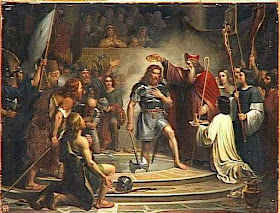 There is a pervasive suspicion of Jesuits in many corners of the Church. Sometimes I and my brothers (ones who FULLY support Church teaching) have been prematurely judged and treated coldly as if we may not. This is sad, and points to the scandal of division in the Body of Christ. Are we a perfect religious order? No. Is there such a thing as a perfect religious order? Absolutely not. From the beginning, God has chosen fallible people to do His work, and that hasn't changed.
There is a pervasive suspicion of Jesuits in many corners of the Church. Sometimes I and my brothers (ones who FULLY support Church teaching) have been prematurely judged and treated coldly as if we may not. This is sad, and points to the scandal of division in the Body of Christ. Are we a perfect religious order? No. Is there such a thing as a perfect religious order? Absolutely not. From the beginning, God has chosen fallible people to do His work, and that hasn't changed. Have some Jesuits made mistakes and errors? Yes, and that is unfortunate. We have also apologized to the Holy Father in our general congregations, and Pope Benedict XVI has recently made it clear how much he supports and trusts us to continue to do what we can to help bring people to God. If you would like to read this AWESOME address by our Holy Father, here is a link in its entirety:
http://www.zenit.org/article-21968?l=english
Link (here) to read the full post by second year Jesuit, John Roselle, n.S.J. his blog is entitled, Going Forth.



























